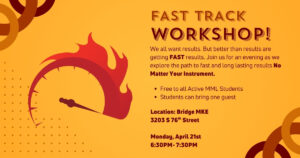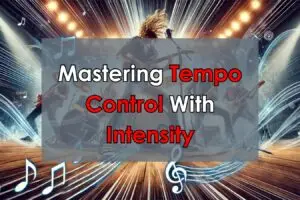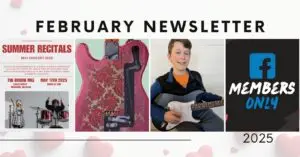In the previous post, I talked about habit making and “The Four Laws of Behavior Change”. I also discussed a bit at length the first of the four laws which we described as “Make It Obvious” or “Cue” and how you can apply these ideas to making guitar practice a regular habit. Today I’m going to move on to the second step know as “Make It Attractive” or “Craving” for short. In this post I’m going to briefly summarize this idea of Craving and how you can use it to your advantage to make guitar practice more attractive. All of these ideas are done much more thoroughly in the book Atomic Habits. It’s a short book but it is a great book for personal improvement and I highly recommend it if you want to improve your daily habits and get rid of bad ones.
Making The Unconscious Conscious
What are cravings? You might think of a craving or an impulse or wanting to solve a problem. While that’s technically true, it misses some of the main points as to why we have cravings. James Clear in his book describes cravings as the desire to go from the state we’re in to the state we want to be. Why do you crave food? Because you’re hungry and you want to satiate yourself? Maybe. Is chocolate custard really the best option though? Maybe you’re not even hungry. Maybe the reason you want your treat of choice is simply to calm your anxiety or to fulfill the desire for inner peace. There’s lots of reasons behind our actions. Maybe more than we’ll ever understand. But taking the time to figure out what those underlying motivations are might be worth a few minutes of your time if it means having a clearer picture of what your true objective is.

“Until you make the unconscious conscious, it will direct your life and you will call it fate.” – Carl Jung
So why understand your motivation? What is the point of looking past the surface? Can’t I just learn to play the guitar in peace?! I think the answer is in two parts.
Clear Objectives
Having clear objective is always important (just like how we talked about having clear language in the last section.) If you have a clear objective then you can prioritize what to work on. You can really envision what kind of guitar player you want to be and what you’ll be when you’re done (if you’re ever really done.) So why do you want to play guitar? Is it a form of relaxation for you? You might think playing guitar will help calm your nerves by experience your favorite music from a different angle. Maybe it’s a challenge. Tackling new challenges is a great way to boost self esteem. Perhaps it’s for the prestige. Not many people can play guitar let alone play guitar well. Maybe you’re trying to impress someone or get their attention by playing guitar. It could also be that you want to feel creative. Music is about self expression and what better way to do it than with your favorite instrument. Whatever your reasons are, really dig deep and don’t just settle for what’s on the surface. Learn your true motivations so you can point the compass in the right direction.
When The Going Gets Tough
Truly understanding your motivation makes it easier to work hard when things get tough. Results don’t come in at a consistent pace. There will be some weeks where it seems like there’s nothing you can’t conquer and there will be others where it feels like you might just be going backwards. Sometimes you may find yourself stuck in a rut where it can take you weeks or even months to get a particular technique down. I can recall a part in college where I had to practice nearly four hours a day for three weeks to get it right. I don’t think I have to explain how grueling and frustrating that was. Understanding my true motivation really helped get me over the hump and achieve my goals.

Temptation Bundling
One cool idea from the book was the idea of temptation bundling. The idea of combining tasks you don’t want to do with tasks you do want to do. I’ll provide an example I unknowingly did from my own life. In high school I was a huge fan of the Simpsons and Futurama (nerd alert). For an hour on cable tv those shows would play back to back every weekday. So for an hour I had a guitar in my hands while I watched reruns of these shows I had seen many times before. During the show I would simply noodle on the guitar. Simple stuff, songs I already could play without too much effort or maybe simple exercises. Then during the commercials, I would actually practice. Mind you, commercials only come in three minute windows, but with five or six of those in a one hour time slot, I would get in fifteen or even twenty minutes of actual practice. That meant that I got in 60 minutes of playing with 15-20 minutes of actual practice. At that point it didn’t even feel like practice. An hour would basically go by and I’d feel like I’d just been doing what I’d always been doing. Going from my previous practice time of fifteen minutes a day to an hour a day meant I was getting better four times faster. A three hundred percent increase is nothing to scoff at. Maybe your increase in playing time won’t increase by that same amount but maybe it will just get you to play a little more consistently.
I did talk a bit about removing temptations in the last section, so this might seem contradictory to what I previously said. At the end of the day, the method you choose is somewhat subjective to each person. You could still apply both ideas at the same time. For example, maybe Tv is not a big vice for you but checking Facebook or Instagram on your phone is. You might be able to play and watch Tv a the same time, but if your phone is in the vicinity you are not focused on anything else. In this case, remove the temptation of your phone in the room. Put it some place out of sight or across the house where you can’t get to it easily. Now the distraction of the phone is gone and you can work on your temptation bundle.
This particular idea is just one of many you could do. There may be others in your life that you are more tempted to work with. You might decide that you can only check Facebook or Instagram for every 5 minutes of guitar playing you do. Maybe you have other hobbies you love like gardening or cooking. You might decide that before you go and garden you have to play guitar for 10 minutes or before you eat a slice of that pie you just baked you have to practice for 5 minutes. These little trade offs make wanting to play the guitar more enticing and will give you a good incentive structure to want to keep practicing. Pick a temptation bundle you think you can manage. Start small and then work your way out from there.
Mind Over Matter
Having a good mindset is also important to keeping it attractive. When we start off playing guitar, we first start by thinking “I get to play guitar”. As time goes on however, that perspective can change to “I have to play guitar”. That subtle change between “getting to” and “having to” can make all the difference in the world. How you perceive your environment changes the way you approach it. What is the guitar to you? Is it a piece of wood or a creative instrument? Is it the object which confines fifteen minutes of your day or is it what gives you fifteen minutes of liberation? Is it something that only you have to do or is it something that not many people CAN do? Those tiny shifts in mindset really make a difference and can sometimes be the difference maker in how hard we work toward something.
Variety
Many times the reason I see students get burned out is because they only work at one thing. For fifteen or twenty minutes all they do is practice one riff or one part of a song. This can be a good thing in small doses. Sometimes the best way to get through something is to just put your nose to the grindstone and get to work. However, we’re human and things can get stale pretty quick. If you asked me would I rather have a student who worked twenty minutes only on one task versus a student who played thirty minutes on three tasks, I’d pick the latter. Even if all three tasks were old tasks, the truth is that the number of repetitions playing the guitar are what matter. A student who plays for thirty minutes on separate subjects will not only have played more, but they are less likely to get burned out on something especially if it’s something they struggle with.

It’s also important to celebrate your accomplishments on guitar. Spending all of your playing time only on new things is not necessarily the best option. Going back to old stuff is valuable. Not only so you don’t forget the things you spent so much time learning but also because it’s worth looking back on everything you’ve completed. Too many times do I see students who feel like they aren’t learning only to look back at six months or a years worth of work and go “Oh wow, I really have come far.” If you find something you like playing, great! Isn’t that the reason you picked up guitar in the first place? Play what you love while also balancing it with just enough new material to help push you forward. Don’t be afraid to play old things especially if you enjoy playing them.
Stay Encouraged
Getting involved with other people puts a whole new spin on things and creates a positive feedback loop that encourages you to play. For me, it started by putting together a ragtag band for a high school talent show. While this is definitely the traditional way people get involved, it’s definitely not the only way. Here are a few additional ways you can keep that positive attitude going.
1. Take Lessons
What a surprise, the guitar teacher recommending you take lessons. Guilty. However, I think a lot of people overlook the benefits that come with taking lessons, specifically in person lessons. A teacher is supposed to not only be a guide but a source of encouragement. They introduce you to new ideas and remind you of the progress you’re making. It’s really easy to not see the paint drying in front of you when you have to stare at it constantly as opposed to the teacher who only sees you once a week. Having a good teacher will encourage you, guide you, and keep you honest
2. Join a Group
There are a ton of public groups when it comes to playing guitar. Locally you’ll find groups that might meet up anywhere from once a month to a couple times a week. Just a bunch of guitar enthusiasts looking to share knowledge, play together, or sometimes trade and sell gear. And now with the age of the internet, there are a million and one groups online who you can join. Some of these groups are very specific and niche. You might find a group that’s specifically for new guitar players less than a year in. You might find a group for blues or jazz. You might even find a group that only wants to learn how to play iron maiden songs! From local to the world wide web, there are no shortage of groups to help you stay encouraged.
3. Find a Practice Buddy
Having a practice buddy can be a huge help. In the early days I had a couple of people who were both at my level as well as far above my level who were willing to practice/play with me. If you can get past the idea of making mistakes with someone else, this method is probably the most consistent way I see fellow students move to the next level. Find a friend who’s willing to practice with you or ask your teacher if there’s anyone else they’re teaching who is looking for someone to play with. You might just make a new friend!
4. Watch Encouraging Content
The internet is full of great lessons, stories, and documentaries especially when it comes to music. I often will have a rotation of my favorite band documentaries playing in the background just because I find it so cool and encouraging. The culture you create around you will determine your mindset and how you want to approach a problem. Seeing cools stories of bands overcoming obstacles or seeing professionals play a cool live performance always gets me in the mood to tackle a difficult song or part. Whether you’re buying DVD’s, watching youtube, or surfing through facebook pages, there is a lot of really cool video on the internet to keep you excited.
5. Playing Live
This is a big leap for a lot of people. Playing live in front of a crowd can be a nerve racking experience. But, it doesn’t have to be as difficult as you think. Even if you don’t have a desire to get into a band, there are plenty of opportunities. Open Jams are a popular option. An open jam has a host band that will play a couple of songs first to set the mood. Next to the stage or at the bar will be a sign up sheet where a musician or group can take the stage and use some of the gear on stage and play 1-3 songs. If they need other band members to come up and play with them, they can recruit the house band for some help. Just be prepared to teach the song quickly to the rest of the band. Don’t make it anything too difficult. Simple is better. You can always attend a jam first to see what its like and ask the band what songs they know already. Then you can go and learn the song at home and come back and play when you’re ready.
You can also sign up for public programs offered by your local city. I’ve seen many public programs offer a “Rock Band” program that takes all levels of musicians and teaches them to work together on stage culminating in a final performance at the end of the program in front of a small crowd. It’s a great way to get introduced into the world of live performance and helps a lot of people grow into the next steps.
To Be Continued…
There’s still so much more to cover. We’re only half way through. Stick around for part 3 or check out part 1 if you didn’t get the chance!





